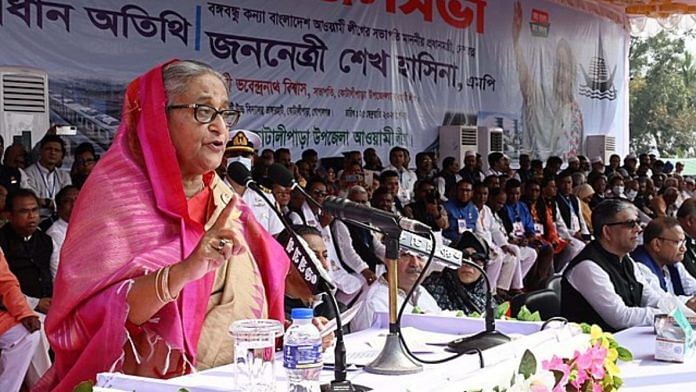Thank you dear subscribers, we are overwhelmed with your response.
Your Turn is a unique section from ThePrint featuring points of view from its subscribers. If you are a subscriber, have a point of view, please send it to us. If not, do subscribe here: https://theprint.in/subscribe/
As political bells started to ring in Bangladesh for general elections scheduled early in 2024, the present political leadership of Awami League has started to see the bangla political landscape carefully as BNP is pressing hard on political and street power. The Bangladesh PM Sheik Hasina though in strong position doesn’t seems to be in that worrisome position as far as internal political challenges are concerned. However, the external challenges seem to appear a bit problematic for Awami League. US has come out with quite eyebrow raising Visa policy for Dhaka recently. According to the policy Visa ban maybe imposed on anyone whoever tries undermine the holding of a free and fair elections in Bangladesh. The policy extends to current and former Bangladeshi officials, members of ruling and opposition parties, law enforcement personnel, judiciary and security services and their family members.
Bangla US Relationship and Triggers
US did not enjoy comfortable relationship with Awami League especially with Bangladesh PM Sheik Hasina. Historic reasons are quite assertive in explaining the fraught relationship. The 1975 blood coup killing Mujib Rehman orchestrated by Bangladesh National Party(BNP) founder and military dictator Zia-ur Rehman is believed to be backed up US-Pak axis, at least some reports surfaced in 2020 did allege that CIA had involvement in backing the coup. Though, former CIA’s Dhaka station chief Phillip Cherry deny the charge and say that in such scenario “US will be seen as a natural suspect” Perhaps, Cherry was referring to US’s cold war alignment and 1971 war. However, US’s unserious attitude on deporting Mujib killers had always casted shadows of suspicion. There have been times when Sheikh Hasina lambasted US for sheltering Mujib killers. This indicates that Bangla-US relationship do not fare well at political levels expect some areas of economic cooperation. Talking from United States’s perspective, Washington DC too have suspicion and areas of irritant with the current leadership of Bangladesh. Time to time US drop some criticism over Sheikh Hasina’s actions against opposition especially when corruption charges against Zia were levelled and later her arrest. Washington DC believes that Sheikh Hasina uses Bangla-China relationship to counter US’s influence. Though, when it comes to geo-economics, Dhaka has limited options and have to deal with US carefully. Presently, US is the biggest destination for Bangladesh’s garment exports, and Bangladesh is the third largest exporter of garments to US after China and Vietnam. The garment industry is the backbone of country’s economy and any affect on this industry will impact Bangladesh economy which is according to Boston Consultancy Group(BCG) report is faring quite well. Dhaka is also lobbying hard for GSP plus status with US and EU which will cut import duties to zero. Perhaps, economic diplomacy maybe useful for US to balance Bangla-US relationship. The indications of the same might started to drop when Sheikh Hasina tabled Bangladesh’s first outlook towards Indo-Pacific region which seemed to be pleasing to US.
US’s Strategic Calculations and New Delhi’s Close Watch
US’s sphere of influence seems to be diminishing in South Asian region post Afghanistan episode. New Delhi’s strategic autonomy and closeness with Russia at one end and China’s increasing its maritime influence and making belligerent attempt towards Taiwan on the other hand are complicating US options in South Asia. Making of Indo-Pacific (AUKUS) as a good counter security construct against China will take time and US needs some geopolitical playfield to swing the current balance of power in South Asia. During cold war, Washington DC did use Dhaka affairs as a geopolitical playfield to fashionably enforce Truman doctrine to challenge strong strategic Indo-Soviet bond. Perhaps, this time too Washington DC’s strategic calculations maybe guided by targeting the Awami Legaue as regime change in Bangladesh will surely open the room for US to influence the balance of power politically in South Asia. If Awami League looses then BNP will get into the power and that means Khaleda Zia, a Pro-Pakistan and China supporter regime will assume the political leadership and this will be not less than a nightmare for India. Khaleda Zia’s regime will surely open the doors for brewing terrorism and anti-India activities. Interestingly, regime change will also give US a geopolitical playfield to keep China on watch and to counter Russia’s increasing influence in central and Southern Asia. Though, New Delhi well-crafted strategic autonomy will prevail but, from national security point of view, regime change will put New Delhi tough situation. To a certain extent Zia regime may bring limitations for US as well when it comes to China, but since US will get political openness with Zia’s regime, things won’t become too difficult as they were with Awami League. Therefore, New Delhi should continue to closely watch the developments and must ensure that its traditional sphere of influence remain unaffected.
These pieces are being published as they have been received – they have not been edited/fact-checked by ThePrint.

